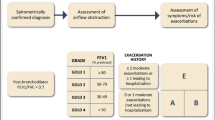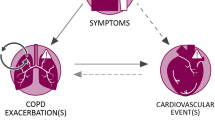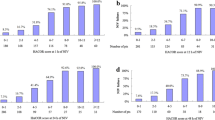Summary
OBJECTIVE: An association between malnutrition, weight loss and mortality has been demonstrated in patients with chronic obstructive pulmonary disease (COPD), but the prognostic influence of low body-mass index (BMI) and plasma concentrations of albumin and cholesterol is less clear in patients with chronic respiratory insufficiency treated with domiciliary long-term oxygen therapy (LTOT). We therefore analysed the prognostic value of BMI, plasma albumin and cholesterol concentrations in patients receiving LTOT. PATIENTS AND METHODS: From 1996 to 2001, LTOT was initiated in 255 patients. Analysis of the impact of nutritional status on survival was confined to a study group of 108 patients in whom the main outcomes, i.e., BMI, plasma cholesterol and albumin, were measured. Standard laboratory methods were used in the biochemical analyses. Pulmonary function was assessed with bodyplethysmography. RESULTS: 63 patients (58.3%) survived for two years post-initiation of LTOT and 45 patients (41.7%) did not. There were no differences between these two groups in pulmonary function tests and arterial blood gases at the start of LTOT. Overall, 10.2% of the study population were underweight, defined as BMI of <20 kg/m2. Compared with patients who survived two years of LTOT, those who did not survive were older (69.3 ± 0.9 versus 64.7 ± 1.2 years, p < 0.01), had significantly lower BMI (24.5 ± 0.7 versus 26.5 ± 0.7 kg/m2, p < 0.05), lower plasma cholesterol (4.61 ± 0.19 versus 5.22 ± 0.13 mmol/l, p < 0.01) and lower plasma albumin concentrations (41.4 ± 0.4 versus 42.8 ± 0.4 g/l, p < 0.05). Logistic regression analysis revealed that, in addition to age (p < 0.01), both BMI (p < 0.05) and cholesterol (p < 0.05) significantly affected the 2-year survival. CONCLUSION: This study suggests that nutritional status is closely linked with prognosis in patients with chronic respiratory insufficiency treated with domiciliary LTOT: low BMI, low plasma cholesterol and low albumin are related to worse 2-year survival in such patients.
Similar content being viewed by others
Author information
Authors and Affiliations
Corresponding author
Rights and permissions
About this article
Cite this article
Tóth, Š., Tkáčová, R., Matula, P. et al. Nutritional depletion in relation to mortality in patients with chronic respiratory insufficiency treated with long-term oxygen therapy. Wien Klin Wochenschr 116, 617–621 (2004). https://doi.org/10.1007/s00508-004-0226-6
Received:
Accepted:
Published:
Issue Date:
DOI: https://doi.org/10.1007/s00508-004-0226-6




